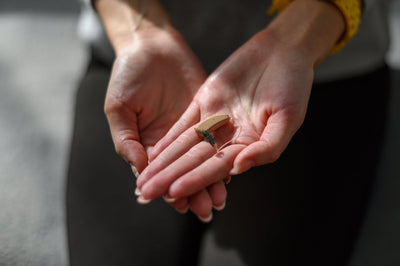How Hearing Aids Can Help You Cope with Hearing Loss
Hearing aids can be an important tool in helping to cope with communication challenges associated with hearing loss. The goal is to find the right fit for you or your loved one that will help maximize auditory performance. Here are a few tips to consider.
Hearing aid fitting is a balancing act between maximizing the benefit of the hearing aid and avoiding the drawbacks. Many factors go into choosing the hearing aid style and the settings on the hearing aid.
Kinds of Hearing Loss
1) Sensorineural Hearing Loss
Sensorineural hearing loss (SNHL) is the most common type of hearing loss and is classified as a permanent hearing loss caused by damage to the cochlea or auditory nerve.
SNHL may be caused by genetics, infection, exposure to loud noise, or aging, and it can occur while you’re a fetus, during childhood, or in adulthood. The hearing loss associated with SNHL is often progressive and difficult to treat, but sometimes a sudden hearing loss in adults is caused by a sudden and reversible obstruction of the ear canal, usually by ear wax.
2) Conductive Hearing Loss
Conductive hearing loss evolves from disruption in the middle ear and is often accompanied by fluid in the middle ear.
It can be caused by a blockage of the Eustachian tubes, the part of the ear that connects the middle ear with the back of the nose, or an infection of the middle ear.
How Hearing Aids Help
Hearing aids are worn to encourage the ear and brain to process sound properly and to help the brain learn to ignore background noises that interfere with speech and other sounds you want to focus on.
Hearing aids also help to eliminate background noise, making it easier for you to hear. They help to filter out certain sounds, like at a busy party, so you can focus on the sounds of the person you’re talking to.
Hearing aids transmit sound through a microphone, amplifier, and speaker. They help the ears to hear the necessary sounds and to filter out the unnecessary ones. They may be digital, analog, and/or behind the ear.
When to Get Hearing Aids
"When to get hearing aids?" is a question that comes up a lot. The best time to get a hearing aid is when you need one. It's not like eyeglasses where your eyesight will get worse and worse over time. However, the earlier you get a hearing aid, the easier it will be to adjust.
There is no “normal” age when people get hearing aids. Some adults do not want to readjust their lives to accommodate their hearing loss. They may not want to admit they need a hearing aid.
People may not want to go around with hearing aids visible on their ears. Some may be too embarrassed to wear a hearing aid.
However, many people find that hearing aids are a lifesaver and make life so much easier. People who get them early are better positioned to talk to people than people who wait. They may not need to ask people to repeat themselves.
Conclusion
Hearing aids are a powerful tool to improve your hearing. They can help you hear people better and strengthen your hearing over time. There is no right time to get one. Bring it up when you’re ready.
If you want to learn more about the best hearing aid in Oregon, HearGlow is here to help. We can evaluate your hearing loss, determine the size and style of your hearing aid and make recommendations to customize your hearing aid to your needs. Get in touch with us today to learn more.
Related Articles



